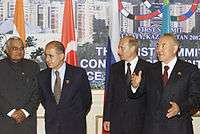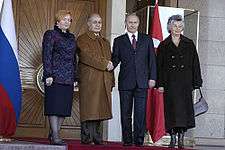Ahmet Necdet Sezer
| His Excellency Ahmet Necdet Sezer | |
|---|---|
 | |
| 10th President of Turkey | |
|
In office May 16, 2000 – August 28, 2007 | |
| Prime Minister | |
| Preceded by | Süleyman Demirel |
| Succeeded by | Abdullah Gül |
| President of the Constitutional Court of Turkey | |
|
In office January 6, 1998 – May 5, 2000 | |
| Preceded by | Yekta Güngör Özden |
| Succeeded by | Mustafa Bumin |
| Personal details | |
| Born |
September 13, 1941 Afyonkarahisar, Turkey |
| Spouse(s) | Semra Sezer |
| Children | 3 |
| Alma mater | Ankara University, Law School |
| Profession | Judge |
| Signature |
 |
Ahmet Necdet Sezer (pronounced [ähmet̪ ned͡ʒd̪et̪ ˈsezæɾ]; born September 13, 1941) is a Turkish politician who was the tenth President of Turkey, serving from 2000 to 2007. Previously he was President of the Constitutional Court of Turkey from 1998 to 2000. The Grand National Assembly of Turkey elected Sezer as President in 2000 after Süleyman Demirel's seven-year term expired. He was succeeded by Abdullah Gül in 2007.
Following his legal career, Sezer became a candidate for the Presidency jointly supported by many political parties in Parliament. Following the 2000 presidential election, he took an ardent secularist approach on issues such as the headscarf and held the view that secularism in Turkey was under threat. A quarrel between Sezer and the Prime Minister Bülent Ecevit in 2001 led to a financial meltdown, attributed to the weakness of the coalition government as well as the existence of a large amount of debt to the International Monetary Fund.
The landslide victory of the conservative Islamist Justice and Development Party (AKP) in the 2002 general election resulted in strong opposition from President Sezer, who vetoed several laws and referred some to the Constitutional Court. These included laws on banking reform and the lifting of Recep Tayyip Erdoğan's political ban. During receptions at the presidential palace, Sezer refused to allow women wearing the headscarf to attend per the laws on separation of mosque and state at the time, resulting in the wives of Abdullah Gül and Erdoğan, Hayrünnisa Gül and Emine Erdoğan respectively, not attending the events. Erdoğan later publicly stated that he had 'suffered a lot' from Sezer.[1]
During the 2014 presidential election, Sezer openly refused to vote, citing the lack of a secularist candidate as his reason.[2]
Early life
Sezer was born at Afyonkarahisar to Ahmet Hamdi Sezer and Hatice Sezer.[3] After finishing Afyonkarahisar High School in 1958, he graduated from the Ankara University Faculty of Law in 1962 and began his career as a judge in Ankara. Following his military service at the Military Academy, he served first as a judge in Dicle and Yerköy, and later he became a supervisory judge in the High Court of Appeals in Ankara. In 1978, he received LL.M. in civil law from the Faculty of Law in Ankara University.
Chief justice
On March 7, 1983, Sezer was elected as a member to the High Court of Appeals. As he was a member in the Second Chamber of Law, he was nominated by the plenary assembly of the High Court of Appeals among the three candidates for appointment as member of the Constitutional Court. On September 27, 1988, he was appointed by the President Kenan Evren as a member of the Constitutional Court. On January 6, 1998, Ahmet Necdet Sezer was elected chief justice of the Constitutional Court.
Presidency (2000–2007)



He was elected president in May 2000, becoming Turkey's first head of state to come from a judicial background. He was sworn in on May 16, 2000. His term was to expire on May 16, 2007, but because the Grand National Assembly of Turkey failed to elect a new president, he retained the office pro tempore until August 28, 2007 (the Constitution of Turkey states that a president's term of office is extended until a successor is elected).
On February 21, 2001, during a quarrel in a National Security Council meeting, he threw the constitutional code book at the Prime Minister Bülent Ecevit. According to some circles, this falling-out was the main obvious reason for "Black Wednesday", a big economic crisis. Others claimed that the rapid reforms for the accession negotiations with the European Union and strong ties with the International Monetary Fund caused the "Black Wednesday" crisis.[4]
Sezer was a firm defender of secularism in Turkey, which was a point of contention between him and the ruling AKP party on many issues. On many occasions, he openly stated that the secular regime in Turkey was under threat.[5] He believes that Islam does not require women to wear headscarves. Sezer went so far as to exclude from official receptions at the Presidential Palace legislators' wives who wore headscarves.[6]
During his presidency, he pardoned 260 convicted felons, 202 of whom were captured leftist militants.[7][8][9] This type of pardon can be requested directly by the felon or the legal representative of the felon, but no political or court referral is necessary. Some organizations have used such pardons to criticize Sezer's presidency. On the other hand, Sezer also enacted new harsh laws to punish people who are connected with terrorism.[10]
Awards and orders
| Ribbon | Award and order | Country | Date | City | Note | Source |
|---|---|---|---|---|---|---|
| |
Order of the Cross of Terra Mariana | |
18 April 2002 | Tallinn | The Terra Mariana Engagement is one of the highest marks given by the Estonian President. | [11] |
References
- ↑ TE Bilisim - Abdullah Tekin. "Başbakan: Ahmet Necdet Sezer'den çok çektim". haberpopuler.com. Retrieved 24 May 2016.
- ↑ "Sezer'den şok karar! Oy vermedi!". Haber7. Retrieved 24 May 2016.
- ↑ "Çalışkan, dürüst ama biraz sert mizaçlı". 26 April 2000. Retrieved 24 May 2016.
- ↑ "IMF Stopped Central Bank From Giving Liquidity in 2001, said Erçel". Referans. Archived from the original on September 29, 2007. Retrieved 2007-08-30.
- ↑ "Turk President Says Secular System in Danger". The Scotsman. Scotsman News. Retrieved 2007-08-30.
- ↑ "Turkey's Turmoil". Economist. May 1, 2007. Retrieved 2007-08-30.
- ↑ "List of Sezer Amnesty Recipients Terror-Based". Dialoghaber. Archived from the original on November 9, 2007. Retrieved 2007-09-04.
- ↑ "Group Profile, DHKP/C". MIPT Terrorism Knowledge Base. Archived from the original on 2007-09-04. Retrieved 2007-09-04.
- ↑ "U.S. Warns of Rising Terror Threat to Westerners Throughout Turkey". World Tribune. Archived from the original on September 27, 2007. Retrieved 2007-09-04.
- ↑ "Turkish President Signs Controversial Anti-terror Bill Subject to Court Review". Jurist, Legal News & Research. Archived from the original on 2006-09-19. Retrieved 2007-08-30.
- ↑ "Sezer: 2002 sonuna kadar AB ile müzakere tarihi bekliyoruz". NTV.com.tr. 19 April 2002. Archived from the original on 21 April 2014. Retrieved 20 April 2014.
External links
| Wikimedia Commons has media related to Ahmet Necdet Sezer. |
- Former presidents: Ahmet Necdet Sezer, Presidency of the Republic of Turkey
- O'Toole, Pam (2000-05-06). "Profile: Ahmet Necdet Sezer". BBC News. Retrieved 2008-08-20.
| Legal offices | ||
|---|---|---|
| Preceded by Yekta Güngör Özden |
President of the Constitutional Court of Turkey January 6, 1998 – May 5, 2000 |
Succeeded by Mustafa Bumin |
| Political offices | ||
| Preceded by Süleyman Demirel |
President of Turkey May 16, 2000 – August 28, 2007 |
Succeeded by Abdullah Gül |

